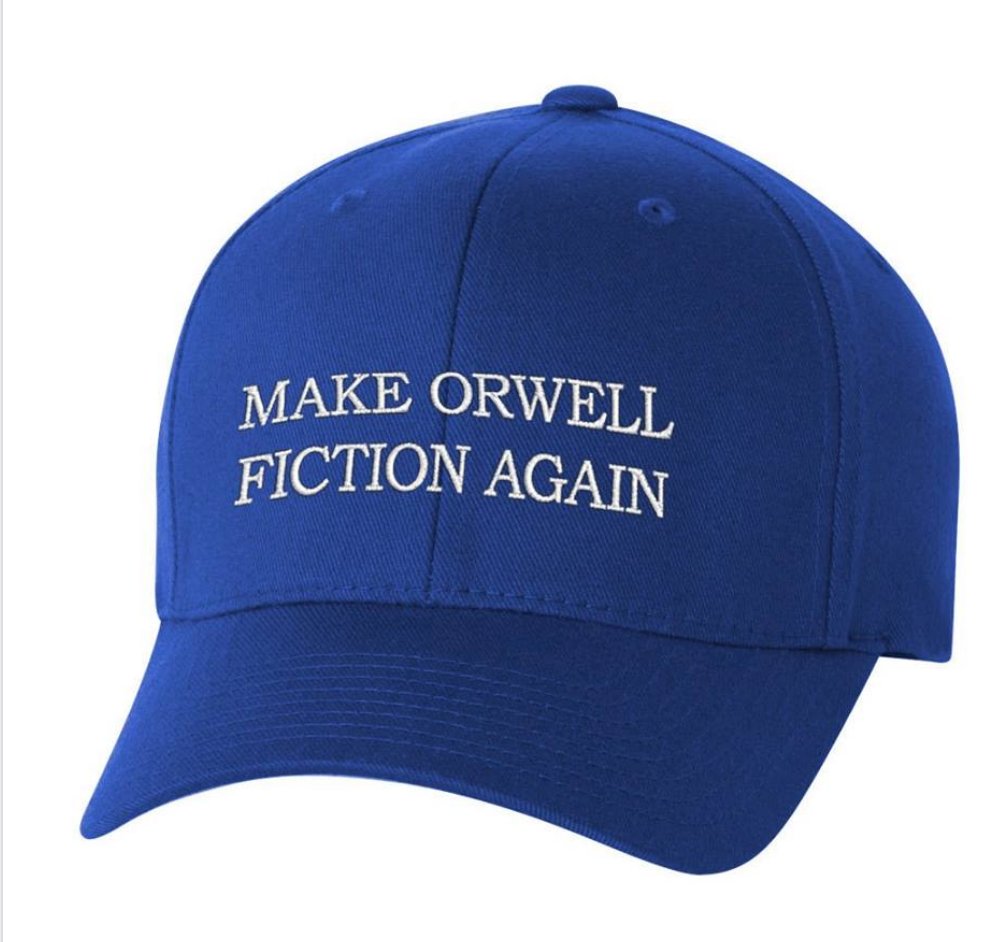
Amen to that. Get your hat or shirt here…
Related Content:
The Cover of George Orwell’s 1984 Becomes Less Censored with Wear and Tear

Amen to that. Get your hat or shirt here…
Related Content:
The Cover of George Orwell’s 1984 Becomes Less Censored with Wear and Tear
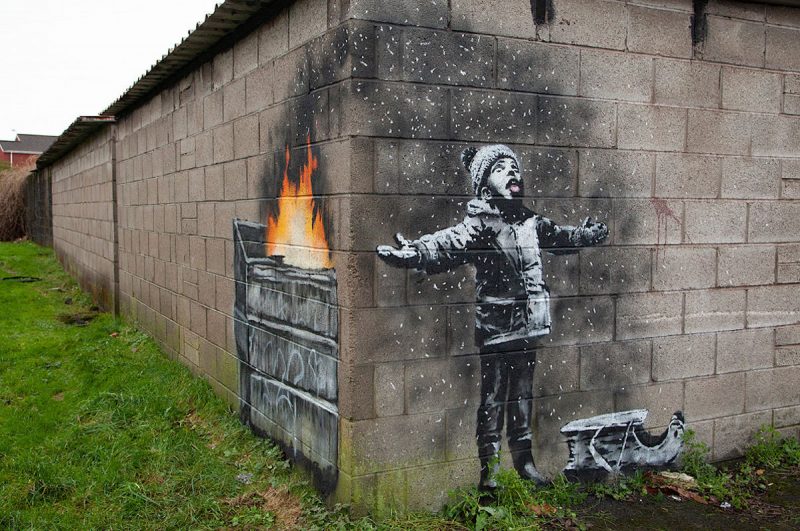
Season’s greetings from Banksy. Two months after shredding a painting at a London auction, the street artist has resurfaced again. This time in Port Talbot, Wales, where he spray-painted a holiday mural on two sides of a garage. One sides shows a young boy frolicking in what looks like falling snow. The other side makes you realize that the snow is really a fire spewing toxic ash.
According to the BBC, Gary Owen, a Port Talbot resident, messaged Banksy last summer and asked him to put a spotlight on Port Talbot’s chronic pollution problem. The steelworks of the industrial town puts dust in the air, creating potential health risks for children. When Owen learned about the mural, he reportedly said: “It’s brilliant. I couldn’t take it in. I didn’t think it was true.” That’s all before some “some drunk halfwit” tried to attack the painting–very fortunately to no avail.
If you would like to sign up for Open Culture’s free email newsletter, please find it here. It’s a great way to see our new posts, all bundled in one email, each day.
If you would like to support the mission of Open Culture, consider making a donation to our site. It’s hard to rely 100% on ads, and your contributions will help us continue providing the best free cultural and educational materials to learners everywhere. You can contribute through PayPal, Patreon, and Venmo (@openculture). Thanks!
Related Content:
Behind the Banksy Stunt: An In-Depth Breakdown of the Artist’s Self-Shredding Painting
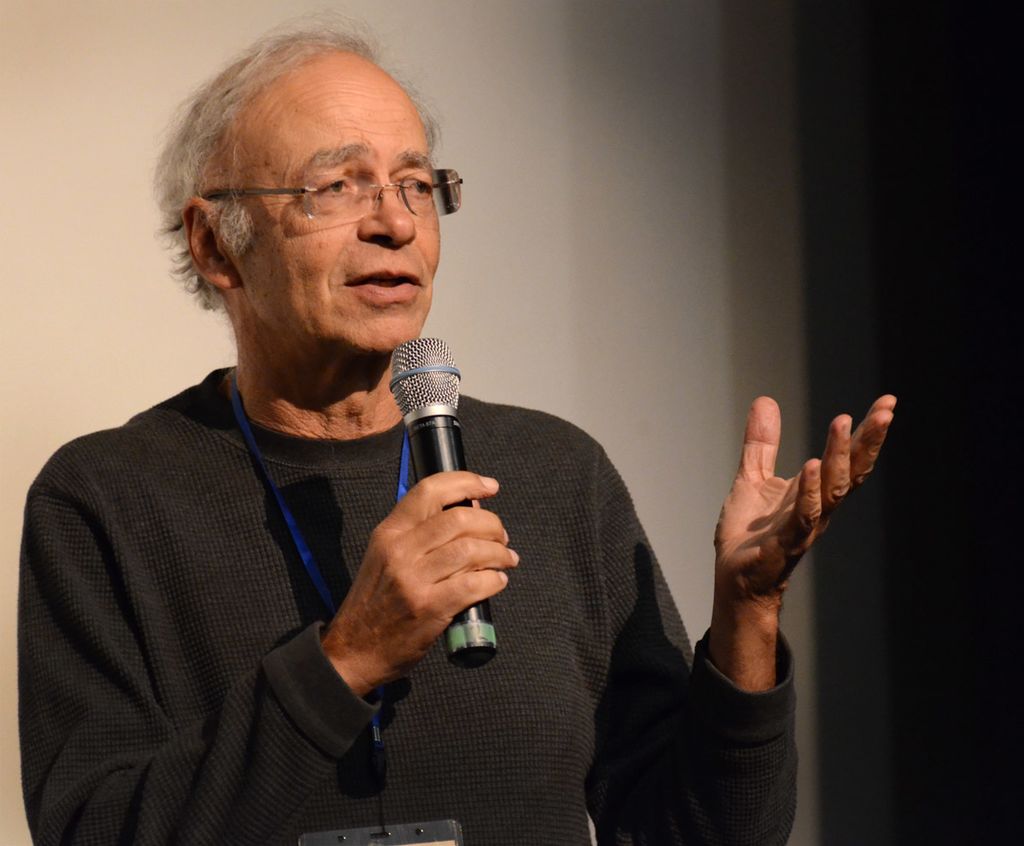
Photo of Peter Singer by Mat Vickers, via Wikimedia Commons
Australian bioethicist Peter Singer has made headlines as few philosophers do with claims about the moral status of animals and the “Singer solution to world poverty,” and with far more controversial positions on abortion and disability. Many of his claims have placed him outside the pale for students at Princeton, his current employer, where he has faced protests and calls for his termination. “I favor the ability to put new ideas out there for discussion,” he has said in response to what he views as a hostile academic climate, “and I see an atmosphere in which some people may be intimated from doing that.”
For those who, like him, make controversial arguments such as those for euthanizing “defective infants,” for example, as he wrote about in his 1979 Practical Ethics, Singer has decided to launch a new venue, The Journal of Controversial Ideas. As The Chronicle of Higher Education reports, the journal aims to be “an annual, peer-reviewed, open-access publication that will print worthy papers, and stand behind them, regardless of the backlash.” The idea, says Singer, “is to establish a journal where it’s clear from the name and object that controversial ideas are welcome.”
Is it true that “controversial ideas” have been denied a hearing elsewhere in academia? The widely-covered tactics of “no-platforming” practiced by some campus activists have created the impression that censorship or illiberalism in colleges and universities has become an epidemic problem. No so, argues Princeton’s Eddie Glaude, Jr., who points out that figures who have been disinvited to speak at certain institutions have been welcomed on dozens of other campuses “without it becoming a national spectacle.” Sensationalized campus protests are “not the norm,” as many would have us believe, he writes.
But the question Singer and his co-founders pose isn’t whether controversial ideas get aired in debates or lecture forums, but whether scholars have been censored, or have censored themselves, in the specialized forums of their fields, the academic journals. Singer’s co-founder/editor Jeff McMahan, professor of moral philosophy at Oxford, believes so, as he told the BBC in a Radio 4 documentary called “University Unchallenged.” The new journal, said McMahan, “would enable people whose ideas might get them in trouble either with the left or with the right or with their own university administration, to publish under a pseudonym.”
Those who feel certain positions might put their career in jeopardy will have cover, but McMahan declares that “the screening procedure” for publication “will be as rigorous as those for other academic journals. The level of quality will be maintained.” Some skepticism may be warranted given the journal’s intent to publish work from every discipline. The editors of specialist journals bring networks of reviewers and specialized knowledge themselves to the usual vetting process. In this case, the core founding team are all philosophers: Singer, McMahan, and Francesca Minerva, postdoctoral fellow at the University of Ghent.
One might reasonably ask how that process can be “as rigorous” on this wholesale scale. Though the BBC reports that there will be an “intellectually diverse international editorial board,” board members are rarely very involved in the editorial operations of an academic journal. Justin Weinberg at Daily Nous has some other questions, including whether the degree, or existence, of academic censorship even warrants the journal’s creation. “No evidence was cited,” he writes “to support the claim that ‘a culture of fear and self-censorship’ is preventing articles that would pass a review process” from seeing publication.
Furthermore, Weinberg says, the journal’s putative founders have given no argument “to allay what seems to be a reasonable concern that the creation of such a journal will foster more of a ‘culture of fear and self-censorship’ compared to other options, or that it plays into and reinforces expertise-undermining misconceptions about academia bandied about in popular media that may have negative effects…. Given that the founding team is comprised of people noted for views that emphasize empirical facts and consequences, one might reasonably hope for a public discussion of such evidence and arguments.”
Should scholars publish pseudonymously in peer-reviewed journals? Shouldn’t they be willing to defend their ideas on the merits without hiding their identity? Is such subterfuge really necessary? “Right now,” McMahan asserts, “in current conditions something like this is needed…. I think all of us will be very happy if, and when, the need for such a journal disappears, and the sooner the better.” Given that the journal’s co-founders paint such a broadly dire picture of the state of academia, it’s reasonable to ask for more than anecdotal evidence of their claims. A few high-profile incidents do not prove a widespread culture of repression.
It is also “fair to wonder,” writes Annabelle Timsit at Quartz, “whether the board of a journal dedicated to free speech might have a bias toward publishing particularly controversial ideas in the interest of freedom of thought” over the interests of good scholarship and sound ethical practice.
Related Content:
The 20 Most Influential Academic Books of All Time: No Spoilers
Josh Jones is a writer and musician based in Durham, NC. Follow him at @jdmagness
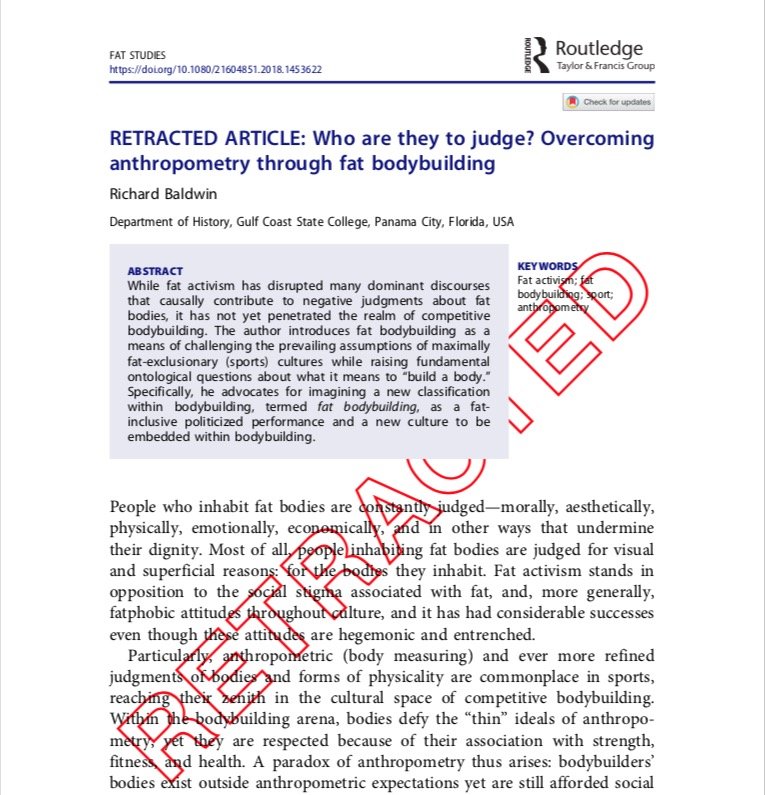
We should be suspicious when researchers assume their conclusion; when the results of an academic study merely confirm the author’s pre-existing biases. Humans are wired to seek confirmation, a cognitive deficit so deeply engrained that it can be exploited among laypeople and specialists alike. Art historians have been fooled by forgeries, historians by fake manuscripts, and paleontologists by phony fossils. Physicist Steven Weinberg referenced such high-level hoaxes in a 1996 essay in The New York Review of Books, and he placed that year’s academic scandal—known as the “Sokal Hoax”—among them.
The gist of the Sokal affair runs as follows: NYU mathematical physicist Alan Sokal suspected that post-structuralist-influenced cultural studies was jargon-laden, obfuscating BS, and he set out to prove it by authoring his own “postmodernist” text, an article full of misused terminology from quantum physics. He sent it off to the journal Social Text, who published it in their Spring/Summer issue. Sokal then revealed in another journal, Lingua Franca, that the article had been a fraud, “liberally salted with nonsense,” and had only been accepted because “(a) it sounded good and (b) it flattered the editor’s ideological preconceptions.”
Sokal’s hoax, it was roundly claimed, demonstrated that certain fashionable quarters of the academic humanities had deteriorated into babble, signifying nothing more than rigid ideological commitments and a general disregard for the actual meanings of words and concepts. Weinberg wasn’t so sure. At most, perhaps, it showed the editorial failings of Social Text. And while humanists may abuse scientific ideas, Weinberg points out that scientists of the stature of Werner Heisenberg have also been prone to slipshod, quasi-mystical thinking.
But the Sokal hoax did expose to the wider public a tendency among a coterie of academics to indulge in mystifying language, including the misuse of jargon from other fields of study, usually in imitation of French theorists like Jacques Lacan, Julia Kristeva, or Jacques Derrida—whom, it must be said, all wrote in a very different intellectual culture (one that expects, Michel Foucault once admitted, at least “ten percent incomprehensible”). For a good many people in the academic humanities, this wasn’t much of a revelation. (Sokal has since published a more thoroughly critical book with the apt title Beyond the Hoax.)
Part of the problem with his hoax as a serious critique is that it began with its conclusion. Cultural studies are rife with crap arguments, ideology, and incomprehensible nonsense, Sokal believed. And so, when his paper was accepted, he simply rested his case, making no effort to engage charitably with good scholarship while he ridiculed the bad. Which brings us to the current state of the academic humanities, and to a contemporary, Sokal-like attack on them by a trio of writers who rest their case on a slightly broader base of evidence—20 fraudulent articles sent out to various niche cultural studies journals over a year: four published (since retracted), three accepted but not published, seven under review, and six rejected.
The authors—academic philosopher Peter Boghossian and writers Helen Pluckrose and James A. Lindsay—revealed the hoax this week in an article published at the Pluckrose-edited Areo magazine. One needn’t read past the title to understand the authors’ take on cultural studies in general: “Academic Grievance Studies and the Corruption of Scholarship.” While all three hoaxers identify as left-leaning liberals, the broad-brush characterization of whole fields as “grievance studies” reveals a prejudicial degree of contempt that seems unwarranted. In the article, they reveal their motivations and methods, outline the successes of the project, and post the comments of the articles’ referees, along with a video of themselves having a good laugh at the whole thing.
This last bit is unnecessary and obnoxious, but does the new hoax—“Sokal Squared” as it’s been called—genuinely undermine the credibility of cultural studies as a whole? Is it “’hilarious and delightful,’” asks Alexander C. Kafka at The Chronicle of Higher Education, or “an ugly example of dishonesty and bad faith?” Harvard political scientist Yascha Mounk tactfully finds in it a serious case for concern: “Some academic emperors—the ones who supposedly have the most to say about these crucial topics [discrimination, racism, sexism]—have no clothes.”
This is a point worth pursuing, and certain recent scandals should give everyone pause to consider how bullying and groupthink manifest on the academic left at the highest level of prestige. But the great majority of academics are not “emperors” and have very little social or economic power. And Mounk is careful not to overstate the case. He points out how the hoax has unfortunately given welcome “ammunition” to right-wing conservative axe-grinders:
Many conservatives who are deeply hostile to the science of climate change, and who dismiss out of hand the studies that attest to deep injustices in our society, are using Sokal Squared to smear all academics as biased culture warriors. The Federalist, a right-wing news and commentary site, went so far as to spread the apparent ideological bias of a few journals in one particular corner of academia to most professors, the mainstream media, and Democrats on the Senate Judiciary Committee.
The Federalist specializes in irresponsible conspiracy-mongering, the kind of thing that sells ads and wins elections but doesn’t belong in academic debate. The question Mounk doesn’t ask is whether the hoaxers’ own attitudes encourage and share in such hostility, an issue raised by several of their critics. As physicist Sean Carroll wrote on Twitter, “What strikes me about stunts like this is their fundamental meanness. No attempt to intellectually engage with ideas you disagree with; just trolling for the lulz.” McGill University political theorist Jacob T. Levy expressed similar reservations in an interview, notes The New York Times, saying
even some colleagues who are not fans of identity-oriented scholarship are looking at the hoax and saying ‘this is potentially unethical and doesn’t show what they think it is showing.’ Besides, he added, “We all recognized that this kind of thing could also be done in our disciplines if people were willing to dedicate a year to do it.”
Therein lies another problem with Sokal Squared. Hoaxes have been perpetuated by smart, dedicated forgers, con-artists, and pranksters in nearly every field, showing up all sorts of experts as potential dupes. The singling out of cultural studies for particular ridicule—the characterization of studies of race, gender, disability, etc. as “grievance studies”—reveals an aggrieved agenda all its own, one that ignores the serious problems corrupting other disciplines (e.g. industry funding in academic sciences, or the gross overuse of undergraduate students as the main subjects of studies—groups that hardly represent the general population.)
Some, but not all, of the successfully-published hoax papers sound ludicrous and terrible. Some, in fact, do not, as Justin Weinberg shows at Daily Nous, and should not shame the editors who published them. Some of the journals have much higher editorial standards than others. (An early hoax attempt by Boghossian targeted an ill-reputed, pay-to-play publication.) The whole affair may speak to broader failures in academic publishing that go beyond a tiny corner of the humanities. In part, those failures may stem from a general trend toward overworked, underpaid, increasingly precarious scholars whose disciplines, and funding, have been under relentless political attack since at least the 1990s and who must keep grinding out publications, sometimes of dubious merit, as part of the overall drive toward sheer productivity as the sole measure of success.
Related Content:
John Searle on Foucault and the Obscurantism in French Philosophy
Noam Chomsky Slams Žižek and Lacan: Empty ‘Posturing’
Josh Jones is a writer and musician based in Durham, NC. Follow him at @jdmagness
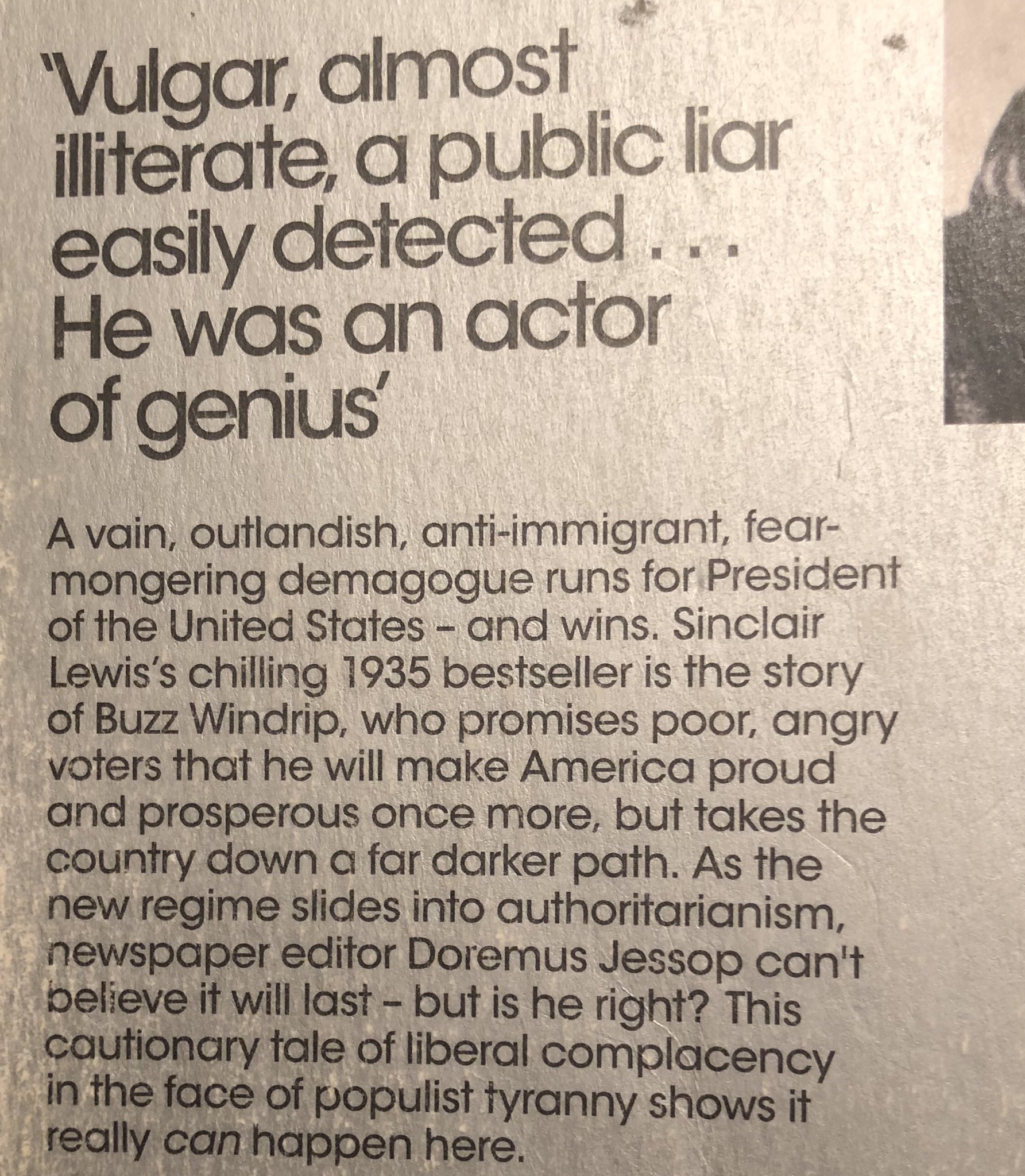
Cameraperson Steve Yedlin surfaced this on Twitter: “Penguin Classic’s back-cover blurb for Sinclair Lewis’s 1935 novel It Can’t Happen Here.” I’ll let this picture, speak for itself…
If you would like to sign up for Open Culture’s free email newsletter, please find it here. It’s a great way to see our new posts, all bundled in one email, each day.
If you would like to support the mission of Open Culture, consider making a donation to our site. It’s hard to rely 100% on ads, and your contributions will help us continue providing the best free cultural and educational materials to learners everywhere. You can contribute through PayPal, Patreon, and Venmo (@openculture). Thanks!
Related Content:
How to Recognize a Dystopia: Watch an Animated Introduction to Dystopian Fiction
George Orwell’s Final Warning: Don’t Let This Nightmare Situation Happen. It Depends on You!
Philosopher Richard Rorty Chillingly Predicts the Results of the 2016 Election … Back in 1998
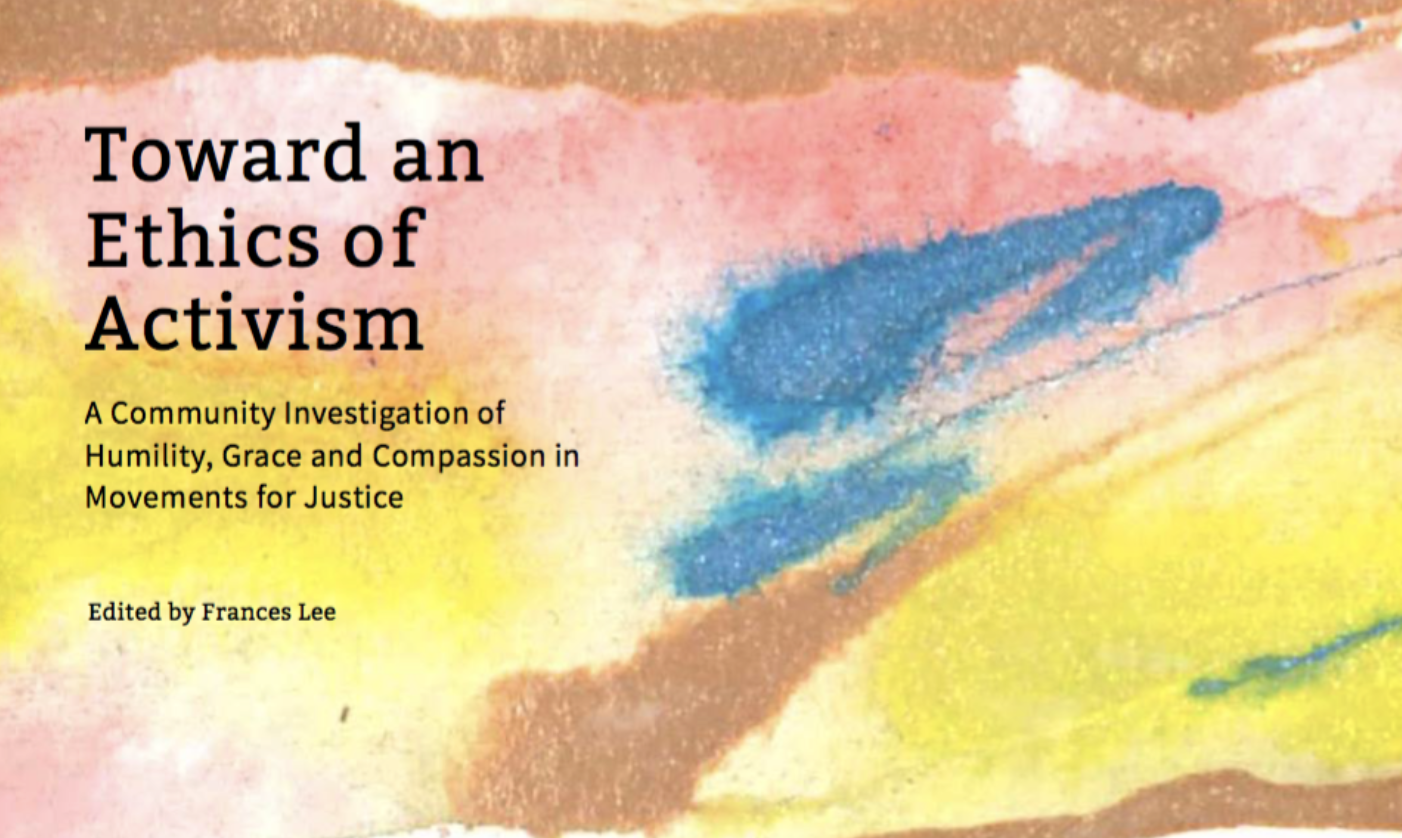
The waters of academia have grown choppy of late, and many veteran sailors have found themselves ill-equipped to navigate the brave new world student activists are forging at a breakneck pace.
Trigger warnings. Safe spaces. Curricula restructured with an eye toward identity. Swift judgments for those who fail to comply.
Admissions brochures and campus tours make frequent mention of their institution’s commitment to social justice. They have to—many high schoolers share the undergrads’ beliefs.
Those of us whose college years are but a distant memory shouldn’t depend on our school’s alumni mag to paint an accurate picture of the battles that may be raging within. Sustainability, preferred pronouns, and inclusive bathroom facilities may get a mention, but the official organ’s unlikely to peek into the abyss where tolerance goes to die.
Cultural scholar Frances Lee, a queer trans person of color recovering from a forced conversion to evangelical Christianity, took a hard look at the problem of intolerance within activist circles as a second year Masters student in Cultural Studies at the University of Washington.
Published exactly one year ago, their essay, Kin Aesthetics: Excommunicate Me from the Church of Social Justice, was plainspoken about the negative side effects of social progress in activist circles, and by extension, on campus:
Telling people what to do and how to live out their lives is endemic to religious and to dogmatic activism. It’s not that my comrades are the bosses of me, but that dogmatic activism creates an environment that encourages people to tell other people what to do. This is especially prominent on Facebook. Scrolling through my news feed sometimes feels Iike sliding into a pew to be blasted by a fragmented, frenzied sermon. I know that much of the media posted there means to discipline me to be a better activist and community member. But when dictates aren’t followed, a common procedure of punishment ensues. Punishments for saying/doing/believing the wrong thing include shaming, scolding, calling out, isolating, or eviscerating someone’s social standing. Discipline and punishment have been used for all of history to control and destroy people. Why is it being used in movements meant to liberate all of us? We all have made serious mistakes and hurt other people, intentionally or not. We get a chance to learn from them when those around us respond with kindness and patience. Where is our humility when examining the mistakes of others? Why do we position ourselves as morally superior to the lowly un-woke?
The essay’s viral success gives extra oomph to “Woker Than Thou: Leftist Activist Identity Formations,” a community course Lee designed and taught earlier this year.
Intended for community leaders, political activists, and organizers, Lee welcomed anyone with any interest in the subject, provided they were willing “to stay open to dissenting or unpopular ideas for the sake of discussion, instead of foreclosing certain topics or ideas by judging them as not worthy of attention.”
The 10-week syllabus delved into such relevant topics as Call-out Culture, the False Promises of Empathy, and of course “wokeness,” a term Lee takes care to attribute to Black culture.
While not all of the required readings can be found online, Lee provides a wealth of links to those that can.
Titles include University of San Francisco Professor Rhonda Magee’s “Addressing Social Injustice with Compassion,” author Andrea Smith’s “The Problem with Privilege,” Trauma Stewardship Institute founder Laura van Dernoot Lipsky’s TEDx Talk on systematic oppression and liberation theory.
There’s even a Sufjan Stevens song that evolved from cheap shots at skater Tonya Harding’s expense to something that considered the “wholeness of the person… with dignity and grace.”
Following Lee’s course materials seems a much more rational way to confront the current social climate than binging on confessional essays by liberal arts professors who feel hamstrung by not-unfounded fears that their students could cost them their jobs … and the good reputation required to secure another.
For further reading, Lee offers free downloads of Toward An Ethics of Activism: A Community Investigation of Humility, Grace and Compassion in Movements for Justice, an anthology that “seeks to disrupt dogmatic, exclusionary activist culture with kindness and connection.”
Find Frances Lee’s “Woker Than Thou” syllabus here.
Download a PDF of the anthology Toward An Ethics of Activism here. (A screen reader accessible version is also available.)
Related Content:
Slavoj Žižek Calls Political Correctness a Form of “Modern Totalitarianism”
Ayun Halliday is an author, illustrator, theater maker and Chief Primatologist of the East Village Inky zine. Follow her @AyunHalliday.
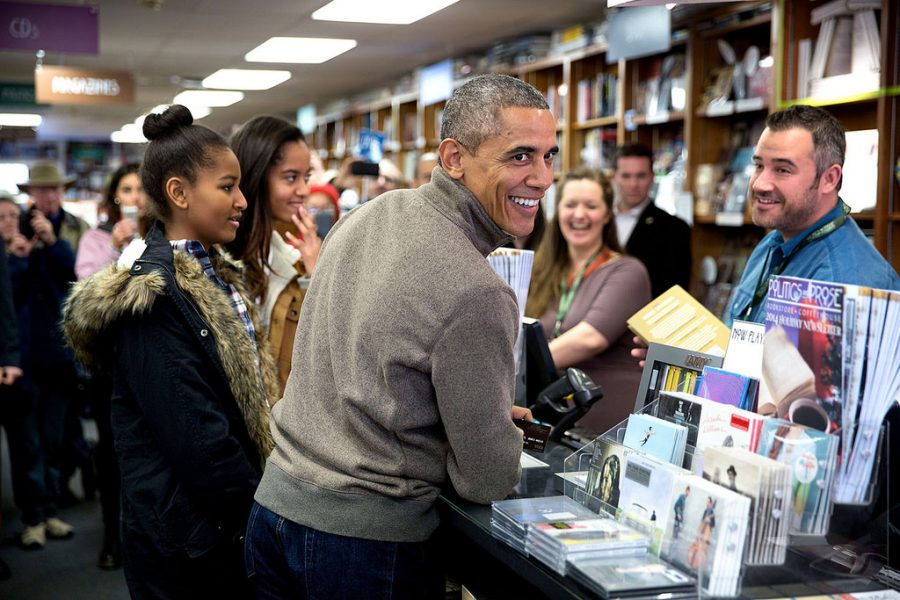
Photo by Pete Souza via obamawhitehouse.archive.gov
Whatever historians have to say about his political legacy, Barack Obama will be remembered as charming, diplomatic, thoughtful, and very well-read. He honed these personal qualities not only as a politician but as a scholar, writer, and teacher, roles that require intellectual curiosity and openness to other points of view. The former president was something of a dream come true for teachers and librarians, who could point to him as a shining example of a world leader who loves to read, talk about books, and share books with others. All kinds of books: from novels and poetry to biography, philosophy, sociology, and political and scientific nonfiction; books for children and books for young adults.
It is refreshing to look back at his tenure as a reliable recommender of quality books during his eight years in office. (See every book he recommended during his two terms here.) Reading gave him the ability to “slow down and get perspective,” he told Michiko Kakutani last year. He hoped to use his office, he said, “to widen the audience for good books. At a time when so much of our politics is trying to manage this clash of cultures brought about by globalization and technology and migration, the role of stories to unify—as opposed to divide, to engage rather than to marginalize—is more important than ever.”
While many people have been hoping he would weigh in on deeply disturbing current events, he “has been relatively quiet on social media of late,” notes Thu-Huong Ha at Quartz. But he has continued to use his platform to recommend good books, suggesting that the perspectives we gain from reading are as critical as ever. “In a Facebook post published on Saturday, Obama recommended some of the nonfiction he’s read recently, focused on government, inequality, and history, with one book that addresses immigration. Together the recommendations are an intellectual antidote to the current US president, who eschews reading,” says Ha.
The list below includes Obama’s brief commentary on each book and article.
Futureface: A Family Mystery, an Epic Quest, and the Secret to Belonging, by Alex Wagner (2018)
Journalist Alex Wagner investigates a potential new twist in her family’s history. “What she came up with,” Obama writes, “is a thoughtful, beautiful meditation on what makes us who we are—the search for harmony between our own individual identities and the values and ideals that bind us together as Americans.”
The New Geography of Jobs, by Enrico Moretti (2012)
Economist Enrico Moretti argues that there are three Americas: brain-hub cities like Austin and Boston; cities once dominated by traditional manufacturing; and the cities in between. “Still a timely and smart discussion of how different cities and regions have made a changing economy work for them,” writes Obama, “and how policymakers can learn from that to lift the circumstances of working Americans everywhere.”
Why Liberalism Failed, by Patrick J. Deneen (2018)
Political scientist Patrick J. Deneen argues that liberalism is not the result of the natural state of politics and lays out the ideology’s inherent contradictions. “In a time of growing inequality, accelerating change, and increasing disillusionment with the liberal democratic order we’ve known for the past few centuries,” says the former president, “I found this book thought-provoking.”
“The 9.9 Percent Is the New American Aristocracy,” by Matthew Stewart (June 2018)
In The Atlantic, Matthew Stewart, author of The Management Myth, defines a “cognitive elite,” a “9.9%” of Americans who value meritocracy and, he argues, are complicit in the erosion of democracy. “Another thought-provoking analysis, this one about how economic inequality in America isn’t just growing, but self-reinforcing,” says Obama.
In the Shadow of Statues: A White Southerner Confronts History, by Mitch Landrieu (2018)
Mitch Landrieu, the former mayor of New Orleans, Louisiana, writes in his memoir of the personal history and reckoning with race that led him to take down four Confederate statues in 2017. “It’s an ultimately optimistic take from someone who believes the South will rise again not by reasserting the past, but by transcending it,” writes Obama.
“Truth Decay: An Initial Exploration of the Diminishing Role of Facts and Analysis in American Public Life,” by Jennifer Kavanagh and Michael D. Rich, RAND Corporation (2018)
This report for the nonprofit RAND Corporation, available as a free ebook, attempts to study the erosion of fact-based policy making and discourse in the US. “A look at how a selective sorting of facts and evidence isn’t just dishonest, but self-defeating,” says Obama.
While the former president no longer has the power to sway policy, he can still inspire millions of people to read—essential for staying balanced, informed, and reflective in our perilous times.
Related Content:
The 5 Books on President Obama’s 2016 Summer Reading List
The Obama “Hope” Poster & The New Copyright Controversy
Josh Jones is a writer and musician based in Durham, NC. Follow him at @jdmagness
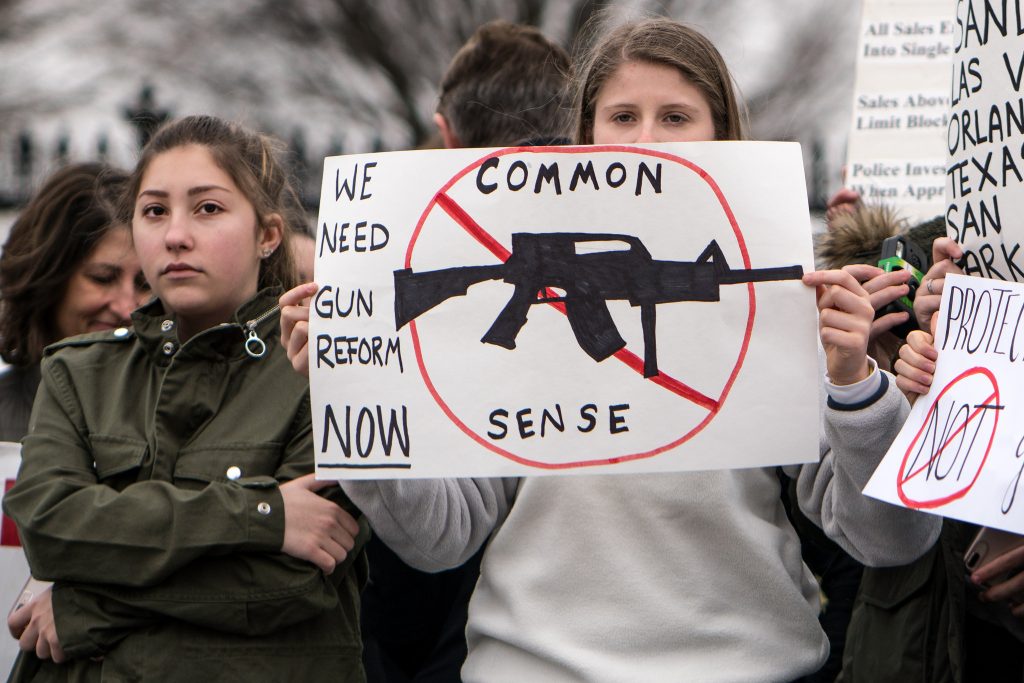
Image by Lorie Shaull, via Flickr Commons
“Will my admission get rescinded if I get suspended for engaging in a school walk-out meant to bring attention to the school shooting issue?” That’s a question many high school students have posed to college admissions offices around the country, especially after some high school officials threatened to suspend students taking part in anti-gun demonstrations.
Many leading universities have since issued policy statements and given these students their blessing and support. In a post called “In Support of Student Protests,” Hannah Mendlowitz, from Yale’s Admissions Office, writes:
[W]e continue to get the question: will Yale look unfavorably upon discipline resulting from peaceful demonstrations?
The answer is simple: Of course not.
To the students who have reached out to us with these concerns, we have made clear that they should feel free to participate in walk-out events to bring attention to this issue without fear of repercussion. Yale will NOT be rescinding anyone’s admission decision for participating in peaceful walkouts for this or other causes, regardless of any high school’s disciplinary policy. I, for one, will be cheering these students on from New Haven.
And on the official Twitter feed for the Brown University, a tweet reads:
Applicants to Brown: Expect a socially conscious, intellectually independent campus where freedom of expression is fundamentally important. You can be assured that peaceful, responsible protests against gun violence will not negatively impact decisions on admission to Brown.
And that’s just the tip of the iceberg. Below, find a list of 175+ universities that have granted similar assurances, along with links to their statements. The list comes from Alex Garcia, who is maintaining a regularly-updated Google Doc. Access it online here.
Again, you can refer to this Google Doc for more updates.
If you would like to sign up for Open Culture’s free email newsletter, please find it here. It’s a great way to see our new posts, all bundled in one email, each day.
If you would like to support the mission of Open Culture, consider making a donation to our site. It’s hard to rely 100% on ads, and your contributions will help us continue providing the best free cultural and educational materials to learners everywhere. You can contribute through PayPal, Patreon, and Venmo (@openculture). Thanks!